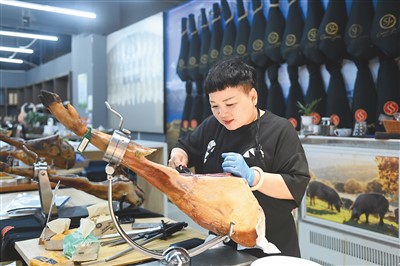China becomes world's largest food importer
China has become the world's largest food importer, and the country's total amount of food imports is expected to reach $140 billion in 2023, according to an industry report recently issued by the China Chamber of Commerce of Import and Export of Foodstuffs, Native Produce and Animal By-Products.
The report showed that from January to September this year, China's total food imports reached $104.26 billion.
The country imported $139.62 billion in food in 2022, a year-on-year increase of 3.1 percent.

A shop owner of Spanish goods slices Iberian ham at the Yiwu International Trade Market in Yiwu city, east China's Zhejiang Province. (Xinhua/Huang Zongzhi)
Last year, China's top six imported food categories included meat and processed meat, grains and products made with processed grains, aquatic products, fruits and fruit products, dairy products, and vegetable oil, with the import value of each category exceeding $10 billion, the report said. Imports of all these categories accounted for 79.1 percent of China's total food imports.
China's food imports have been increasing steadily in recent years. The country's food imports grew from $49 billion in 2013 to $139.62 billion in 2022, registering an annual growth rate of 12.3 percent.
More and more niche brands and products are entering the Chinese market. About three years ago, Vina Concha y Toro, a famous wine producer in Chile, introduced a brand of Argentine wines, which are lesser known to Chinese consumers, to China.
"We found that Chinese consumers were increasingly looking for wines with new flavors and showed their interest in niche Argentine wines with unique flavors," said Zhou Yuan, e-commerce key account manager of the company.
"Chinese consumers continue to pursue quality upgrades, and their demand for imported food is still rising. We are very confident in the future," Zhou added.
Chinese consumers' demand for imported food has become more personalized and diverse. Industry insiders said Chinese consumers have "become more sophisticated,” which continuously creates new requirements for the supply of imported food.

Visitors select French wines at an import and export commodities fair recently held in north China's Inner Mongolia Autonomous Region. (Photo/Ding Genhou)
For example, Chinese consumers' purchasing power for chocolates has improved rapidly in recent years, and they have had higher requirements for chocolates, said Su Hang, chief procurement officer for casual snacks at Alibaba's online grocery platform Tmall Supermarket.
As China sees more varieties of imported food, overseas brands consider the Chinese market as one of the most important sources of incremental growth in the future, Su added.
By analyzing over 300 million Tmall Supermarket users, Su found that Chinese consumers now pursue healthier lifestyles, care more about the nutrients and functions of food, prefer changes brought by cutting-edge technologies, favor naturally flavored food, and gain a stronger environmental awareness.
Vina Concha y Toro is preparing to launch low-calorie wines targeting the Chinese market. "Our preliminary research found that quite a few young people like sports, outdoor activities, and healthy lifestyles. Our new product will provide more options for them," said Zhou.
Zhou added that the company will also offer more premium wines to satisfy consumers' increasingly diverse demand from multiple dimensions in the future.
China's imported food market continues to expand with more trading partners, and this meets Chinese consumers' demand for higher-quality food and injects momentum into the thriving development of global agriproduct trade, the report said.
Photos
Related Stories
- Trending in China| Milk fan: A delicious snack from SW China
- LA LISTE 2024 world restaurant ranking unveiled
- Technology adoption a key driver of greater global food production
- River snail rice noodles from Liuzhou in China's Guangxi exported to 28 countries and regions
- Northeast ethnic barbecue culture, flavor embraced across China
- 2nd Western China Pre-made Food Industry Development Conference kicks off in Chongqing
Copyright © 2023 People's Daily Online. All Rights Reserved.









